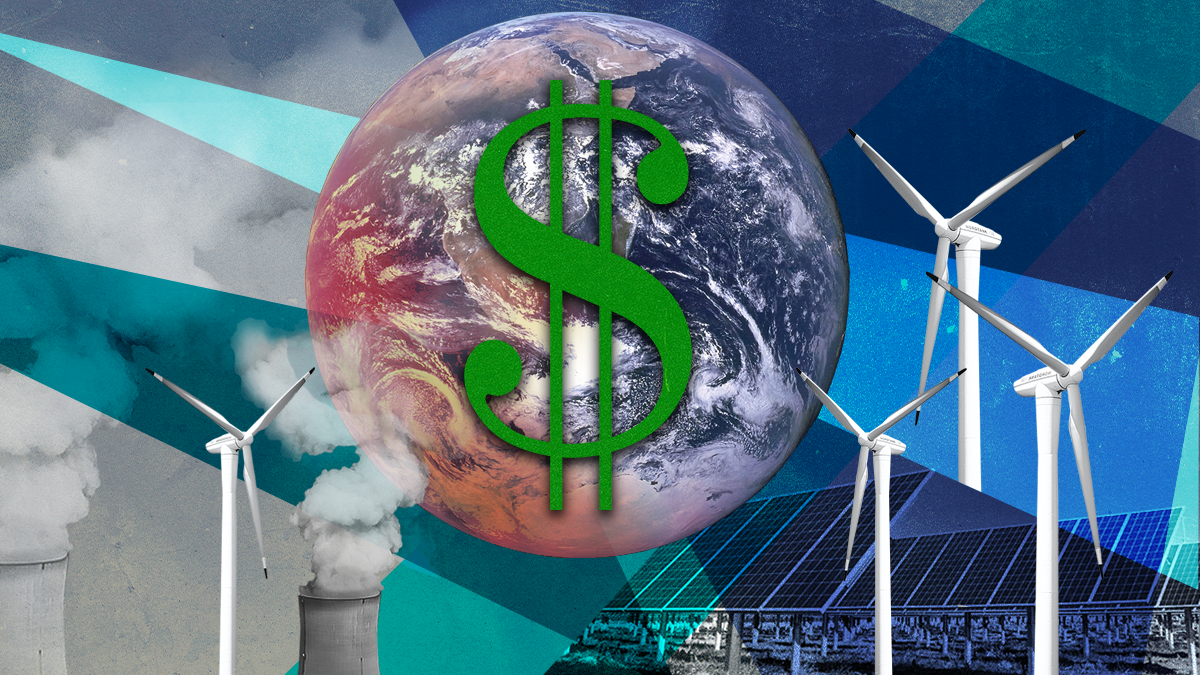April 20, 2023
The theme of this year's Earth Day on Saturday is "Invest in Climate." One of the key messages is that "businesses, governments, and civil society are equally responsible for taking action against the climate crisis." But they are not equally motivated.
Businesses invest for profit. Governments spend to achieve political goals. And civil society's pockets are ... empty.
Meanwhile, roughly $5 trillion is needed to help the planet transition to clean energy by the end of the decade. Most of that money would go to the developing world, which is historically less responsible for polluting the planet but disproportionately suffers the impacts of climate change.
Yet the official statement doesn't even mention climate finance. Why?
Earth Day is all about climate activism. Governments are mostly an afterthought — unless to portray them "in a negative light and called out for their perceived lack of efforts to adequately invest in — and ultimately save — the planet," says Eurasia Group analyst Franck Gbaguidi.
Developing nations have long been telling wealthy ones: You need to cough up the cash for us to go green because you're mostly responsible for global warming. Rich countries have been like: Yeah you're right, but I have other spending priorities right now, so lemme dig up some coins from my sofa cushions.
For the Global South, though, the Western response to Russia's war in Ukraine demonstrated that wealthy nations can in fact mobilize immense financing virtually overnight — when it's in their political interest.
Developing countries are fed up. They are feeling the impacts of climate change more acutely than wealthy nations, which broke a 2009 promise to channel $100 billion annually of climate finance to the Global South by 2020. What's more, developing nations are now struggling even more economically under a pile of COVID-fueled debt and higher interest rates, which raises the cost of servicing that debt.
Still, there's growing chatter that 2023 might be a pivotal year. For one thing, the developing world now has a media-savvy champion in Mia Mottley.
The feisty Barbados PM, who became a global climate icon with a breakout speech at COP26 in Glasgow, Scotland, spearheads the Bridgetown Initiative. This group pushes global institutions like the World Bank to adopt new policies, such as loan disaster clauses that allow a government to temporarily stop paying its loans without penalty following an extreme weather event.
For another, the World Bank itself will soon have a new boss in former Mastercard CEO Ajay Banga, who says he wants to double down on climate finance by mobilizing more private-sector funds. But how?
One idea is for the World Bank to act as an insurance agent for private investment in climate projects in the developing world, which can be risky and expensive. Basically, private lenders and the World Bank would join forces and pool their money, but the institution would pick up most of the tab if the project went south.
Expect the climate finance convo to heat up as we get closer to the COP28 Climate Summit in Dubai in late November. You might recall that last year's COP27 in Egypt wrapped with a vague pledge by rich nations to bankroll a climate reparations fund for the developing world.
That's no surprise, given that the issue has become a much bigger priority for developing economies and a much less pressing topic for rich countries than in 2021, when net-zero emissions commitments were a dime a dozen.
But the stakes will be even higher at COP28, hosted by the UAE, a mega-rich petrostate that’ll side with the cash-strapped Global South. Huh? The Emiratis are investing heavily in green power and want to fight the bad optics of emceeing as a fossil fuel producer.
"Failure to show concrete progress [on the reparations fund] will deepen the divide between industrialized and emerging markets, exacerbate the geopolitical fragmentation of the world, and potentially delay concrete actions to stop global warming," says Gbaguidi.
From Your Site Articles
More For You
- YouTube
In this Quick Take, Ian Bremmer breaks down the growing tensions between the US and Iran, calling it "the next area of potential large-scale conflict where President Trump is interested in changing the facts on the ground."
Most Popular
A flood victim stands at her flooded home after weeks of heavy rainfall in Boane District, Maputo, Mozambique, January 19, 2026.
REUTERS/Amilton Neves/File Photo
392,000: The estimated number of people displaced across Mozambique by recent rain-induced floods. Severe flooding in the southern African nation, as well as in South Africa and Zimbabwe, has killed over 100 people.
© 2025 GZERO Media. All Rights Reserved | A Eurasia Group media company.
